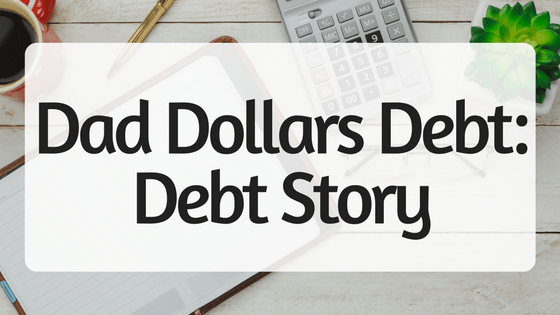Today’s Debt Story comes from www.dadsdollardebts.com
How did you get the debt?
I was quick to spend money in college, but it was in medical school that I took out the largest chunk of debt. I paid for my tuition but then maxed out my loans to enjoy the finer things in life, hot wings and beer…lots of beer. My debt quickly went from the $20k in college to $150k by the end of medical school. Add loan forbearance throughout my training, and 7 years later I am sitting with $180k in school debt.
What made you want to get rid of the debt?
As a new physician, I still wasn’t paying attention to my finances. I spent how I wanted, ate nice meals, and had enough money to pay my bills. I would have likely continued down this path but somewhere in 2014 I realized it was not sustainable.
A lot of the desire probably arose from a dissatisfaction in my work. I had worked so hard to become a doctor and 2 years into practice was feeling burnt out. That along with seeing the negative balance sheet of my net worth made me depressed. I started reading Mr Money Mustache and the White Coat Investor, taking on Financial Samurai a little later in personal finance education. I realized I needed a plan. So I came up with one. Calculate my net worth, cut some spending, and pay down debt.
How long did it take you to pay it all off?
Still working on it. Since 2014 I have improved our net worth by $350,000. Not too shabby considering I started tracking it in June 2014.
What resources did you use to help pay off the debt?
I read Mr. Money Mustache, White Coat Investor and Financial Samurai on line. I also picked up a bunch of different books including The Millionaire Next Door and The Boggleheads Guide to Investing.
What were the challenges that you faced?
Lifestyle inflation. I am still fighting it. I moved for a new job closer to my wife’s family and with a higher pay. We sold our old house and were renting an apartment for 6 months. Despite all my plans, we still ended up buying a house that is about 1000 square feet to big for us and $500k more than I wanted to spend.
How did this affect your marriage/family?
My wife and I discussed my concerns and our family financial plan a lot at the beginning and the first 2 years. Luckily my wife is a fairly spending conscious woman. She is not buying expensive purses and reminds me that our cars are paid off every time I want something new.
Still, 2 years of discussing our monthly spending led to some stress. She was not happy talking about it because she felt she was already giving it her all. She was right and it was not good for our marriage. So we stopped talking about it.
Now I tell her our net worth which is always going up. I will also mention if we spent more than we brought in, which is rare now. When we first bought the house we were in the red for 6 months straight. Brutal but good thing we had savings.
Now my idea of FIRE is our discussion, but rarely. The financial plan is laid out. We enjoy our life and are saving, so no need to stress her out about it.
What were you doing for a living?
I am a Cardiologist. I have the fortune of a high income, but did not start earning any income until I was 25 and $180k in debt. The big bucks came when I hit 31 and finished training.
How did it feel once it was paid off?
Umm…whoops, I am still paying it off. I have school debt and my house. Thats it but it is enough to stress me out.
What are some practical tips you can share with people looking to pay off their debt?
- Calculate your net worth. Gotta know how much debt you have
- Set up a expense report each month to see where money is going out and how you can cut it down. Cut the fat each month.
- Take bonuses or unexpected money and invest in retirement accounts or pay off debt.
- Apply, rinse, and repeat.







